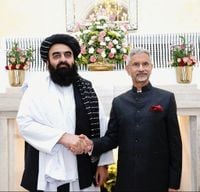India is set to significantly deepen its diplomatic engagement with Afghanistan by upgrading its technical mission in Kabul to a full-fledged embassy—an announcement that signals a new phase in the relationship between New Delhi and the Taliban administration. The decision, made public by Indian Foreign Minister Subrahmanyam Jaishankar on October 10, 2025, follows the first high-level diplomatic meeting between the two countries since the Taliban seized control in 2021. The shift comes at a pivotal moment for both nations, with regional rivalries, international isolation, and humanitarian concerns shaping the evolving landscape.
Jaishankar revealed the embassy upgrade during a joint press briefing with Afghanistan’s Foreign Minister Amir Khan Muttaqi in New Delhi. Muttaqi’s six-day visit to India—the first by a Taliban leader since their return to power—was made possible after the United Nations Security Council Committee granted him a temporary exemption from international travel sanctions. As reported by Reuters and the Associated Press, Muttaqi is among several Taliban officials facing U.N. sanctions, including travel bans and asset freezes, a stark reminder of the group’s contentious status on the world stage.
“India is fully committed to the sovereignty, territorial integrity and independence of Afghanistan,” Jaishankar stated, emphasizing the broader vision behind the diplomatic move. “Closer cooperation between us contributes to your national development, as well as regional stability and resilience.” While he did not specify a timeline for the embassy’s reopening, the intent was clear: India is ready to invest in Afghanistan’s development, particularly in sectors like trade, health, and education.
For the Taliban, the visit and India’s announcement represent a rare diplomatic victory amid persistent isolation. “We hope that Afghanistan and India, on an official level and in different areas, increase their engagement,” Muttaqi remarked, as quoted by Reuters. He underscored ongoing counter-terrorism efforts, assuring that Afghanistan would not be used as a springboard for attacks on other nations—a point likely aimed at assuaging Indian and international security concerns. “The Taliban administration would not allow anyone to use Afghanistan’s territory for targeting other nations,” he said.
The diplomatic thaw is rooted in pragmatic calculations. India’s decision to engage more deeply with the Taliban is shaped by the shifting sands of regional politics—specifically, its desire to counter the influence of Pakistan and China in Afghanistan. According to Harsh Pant, foreign policy head at India’s Observer Research Foundation, “Engagement does not mean endorsement. There are many things that India is uncomfortable about (under Taliban rule)—minority rights, gender rights, and the human rights landscape in Afghanistan. But there is a pragmatism inherent in India's engagement with the Taliban ... And this visit is, in some ways, continuing that tradition.”
The rivalry with China and Pakistan looms large. Both countries have established diplomatic footprints in Afghanistan, and China, in particular, has moved proactively to engage the Taliban administration. “With Beijing proactively engaging the Taliban, New Delhi wouldn’t want its primary strategic rival to hold exclusive influence over Kabul,” observed Praveen Donthi, senior analyst with the International Crisis Group, as cited by the Associated Press. India’s outreach is thus as much about regional balance as it is about bilateral ties.
India’s relationship with Afghanistan has a long and complex history. Traditionally, the two countries have enjoyed friendly ties, but the Taliban’s rise to power in 2021 upended the status quo. India, wary of increased Pakistani influence and the potential spillover of extremism into Kashmir, closed its embassy in Kabul after the U.S.-led NATO withdrawal. However, by 2022, New Delhi had recalibrated its stance, opening a small technical mission focused on humanitarian aid, trade, and medical support. This mission laid the groundwork for the current upgrade to a full embassy.
Despite these developments, India has stopped short of formally recognizing the Taliban government. “India and Afghanistan have historically had friendly ties, but New Delhi does not recognise the Taliban government,” Reuters reported. The distinction is crucial. As experts point out, engagement does not equate to endorsement. “The engagement between India and Afghanistan may or may not lead to formal de jure recognition of the Taliban government,” said Gautam Mukhopadhaya, India’s former ambassador in Kabul. He cautioned that India “should preserve some levers to enable positive change internally for the benefit of all Afghans.”
Internationally, the Taliban administration remains largely isolated. About a dozen countries—including China, Russia, Iran, Pakistan, and Turkey—maintain embassies in Kabul, but only Russia has formally recognized the Taliban government, a move made in July 2025. The path to broader international recognition is hampered by the Taliban’s strict restrictions on women and girls, a point repeatedly highlighted by Western diplomats. As Reuters notes, “the Taliban administration's path to recognition is being stalled by its curbs on women.”
Afghanistan’s diplomatic presence in India has also shifted in recent years. The Afghan embassy in New Delhi was permanently closed in November 2023, though consulates in Mumbai and Hyderabad continue to provide limited services. Meanwhile, India continues to host tens of thousands of Afghan nationals, including students and businesspeople, many of whom fled the Taliban’s rule.
Security concerns remain a backdrop to the renewed engagement. Indian analysts remember the 1999 hijacking of an Indian airliner to Taliban-controlled Afghanistan, an event that resulted in the release of jailed insurgents in exchange for hostages. The episode left a lasting impact on Indian policymakers, fueling both caution and the desire to avoid repeating past mistakes. “Now India has been driven to proactively engage with the Taliban, both to avoid similar pitfalls and to accomplish a strategic need to counter Pakistan,” Donthi explained.
During Muttaqi’s visit, discussions are expected to cover a wide range of issues, including political, economic, and trade relations. Both sides have expressed a desire to expand cooperation, though the specifics remain to be seen. For the Taliban, deeper ties with India offer a potential pathway to economic support and, eventually, greater international legitimacy. For India, the move is a calculated step to protect its interests in a volatile region and to ensure it does not cede influence to its rivals.
Still, many in India remain wary. “There are many things that India is uncomfortable about (under Taliban rule),” noted Pant, referencing ongoing concerns about human rights, especially for minorities and women. Yet, the prevailing mood in New Delhi is one of pragmatic engagement, recognizing that isolation has not yielded the desired outcomes and that dialogue, however cautious, may offer new opportunities.
As the dust settles on this diplomatic breakthrough, both nations face a delicate balancing act. India must navigate its strategic interests without appearing to legitimize policies it finds objectionable, while the Taliban seeks to parlay engagement into economic benefits and international recognition. The world will be watching closely to see whether this new chapter leads to meaningful change—or merely a reshuffling of old alliances.



